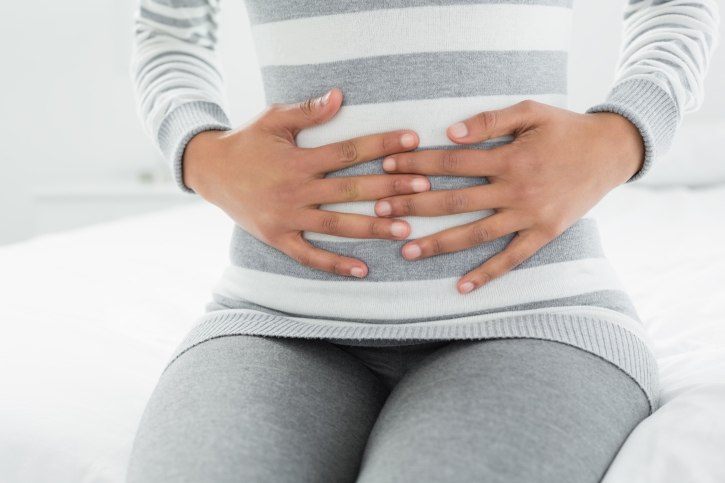 When it comes to the sexual health of women, we can often run into issues concerning our reproductive organs, and sometimes these issues go unchecked and undiagnosed. One of the most common and least spotlighted issues that plague the ovaries is polycystic ovary syndrome (PCOS) and is a condition that affects 1 in 10 women and 1 in 20 women of childbearing age. Higher percentages are found in African-American females (8%) and Latinas (13%) than among Caucasians (4.8%).
When it comes to the sexual health of women, we can often run into issues concerning our reproductive organs, and sometimes these issues go unchecked and undiagnosed. One of the most common and least spotlighted issues that plague the ovaries is polycystic ovary syndrome (PCOS) and is a condition that affects 1 in 10 women and 1 in 20 women of childbearing age. Higher percentages are found in African-American females (8%) and Latinas (13%) than among Caucasians (4.8%).
The underlying problem with PCOS is a hormonal imbalance and because of it's unknown cause, PCOS can only be treated and not cured. As many as 5 million women in the United States are affected by the condition, yet 50% of these cases go undiagnosed.
Continue reading for the causes, symptoms and treatment options for PCOS.
Causes
PCOS has been linked to an imbalance in hormones due to an overabundance of insuline within the female body that isn't able to be absorbed and used properly. The ovaries of women living with PCOS produce a high amounts of androgen (a male hormone) that affect the development and release of eggs during ovulation and can cause a delayed or an absence of a menstrual cycle. PCOS is the number once cause of female infertility.
READ: How Normal Is Menstrual Irregularity?
Symptoms
- Infrequent, absent, and/or irregular menstrual periods
- Infertility (inability to get pregnant) because of not ovulating. In fact, PCOS is the most common cause of female infertility.
- Hirsutism (HER-suh-tiz-um) — increased hair growth on the face, chest, stomach, back, thumbs, or toes
- Cysts on the ovaries
- Acne, oily skin, or dandruff
- Weight gain or obesity, usually with extra weight around the waist
- Male-pattern baldness or thinning hair
- Patches of skin on the neck, arms, breasts, or thighs that are thick and dark brown or black
- Skin tags — excess flaps of skin in the armpits or neck area
- Pelvic pain
- Anxiety or depression
- Sleep apnea — when breathing stops for short periods of time while asleep
Treatment
Supplements and specific herbs have shown to be effective in helping those with PCOS boost their fertility and give birth to healthy babies. The overall goal with PCOS is to balance blood sugar levels, maintain hormonal balance, promote healthy digestion for improved estrogen metabolism, while also working to promote regular ovulation and menses. Adaptogen herbs are also important, this is because adaptogens increase resistance to mind-body stress and enhance overall vitality and health through non-specific adrenal (known as stress glands) support. Plants recognized as adaptogens help to normalize the body’s functions, most importantly the endocrine system, even during diseased states, are non-toxic, nutritive, and have been deemed safe for long term use.
Some of these supplements include:
Cod Liver Oil
Again, cod liver oil is a rich source of omega-3 EFA’s. Eating omega-3 essential fatty acids can help to lose weight, balance hormones, and creates a healthy environment for conception. Omega-3 EFA’s have been shown to aid hormonal regulation and reduce inflammation.
Licorice root (Glycyrrhiza glabra)
Licorice root helps the body to maintain proper hormone production and release. Licorice also supports healthy insulin levels and liver health which is important for women with PCOS.
Maca (Lepidium meyenii)
Maca works to balance estrogen and progesterone in the body which may help to encourage a healthy menstrual cycle. Maca is an adaptogen and an incredible fertility superfood . It helps to balance the hormones, but does not contain any hormones itself. It is able to do this by nourishing the endocrine system.
Vitex (Vitex agnus-castus)
Vitex (Chaste Tree Berry) is one of the most powerful herbs for women’s fertility and menstrual health. There are numerous studies and testimonials of Vitex and its effects on the body . Vitex supports hormonal balance in the body by having an effect on the hypothalamic-pituitary-ovarian axis (hormonal feedback loop), correcting the problem at the source.
Making lifestyle changes by incorporating more frequent and rigorous exercising,...
... a 5-10% weight loss and a diet filled with fiber, low carbohydrate intake and low fat intake can help with keeping the condition under control, as well as help reduce the risks of developing chronic conditions associated with PCOS such as diabetes, heart disease and endometrial cancer. Using birth control as a way to keep a healthy balance of hormones is also a frequently recommended treatment for PCOS.
READ: Can Acupuncture Help Treat Polycystic Ovary Syndrome?
Visit the BlackDoctor.org Womens Health center for more articles.









